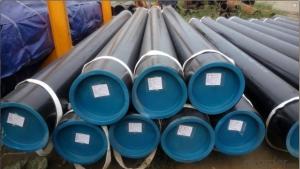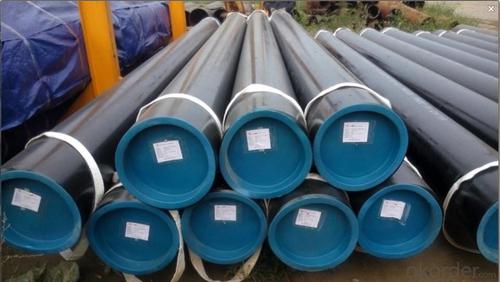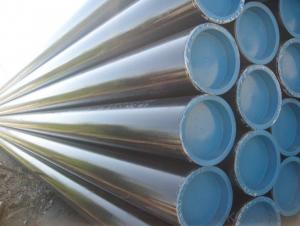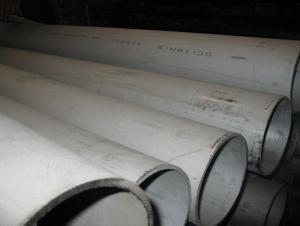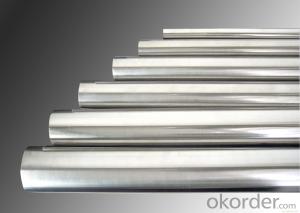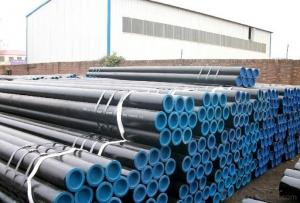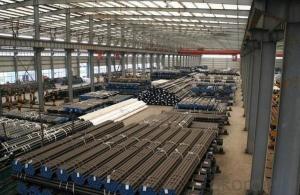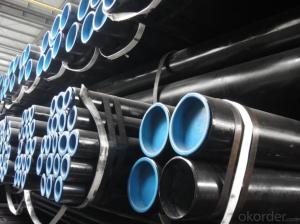Hot rolled black seamless steel tube Gr.B
- Loading Port:
- Tianjin
- Payment Terms:
- TT OR LC
- Min Order Qty:
- 10 m.t.
- Supply Capability:
- 10000 m.t./month
OKorder Service Pledge
OKorder Financial Service
You Might Also Like
1. Commodity Name: Seamless steel pipe
2. Standard: API,GB,ASTM,ASME,DIN
3. Quality grade: 10#, 20#, A106B, A53B, API 5L B, Q235, Q345, ST37-2, ST 45, ST52.etc.
4. Dimension:
OD: 1/2"-24"
WT: 2.5-80mm, SCH10~SCH40~XXL
length: 5.8m,6m,8m,9m,12m
5. Technique: Hot Rolled/Cold Rolled/ Cold Drawn
6. application
carbon seamless steel pipes are widely used in gas, water and oil, transpotation;constructions;Bridge,highway,windows of model steel door; building materials;fences;heating facilities Fluid Pipe;conduit pipe,scaffolding pipe.etc.
7. Payment Terms: L/C D/A D/P T/T
8.packing and shipment
Packaged in bundles,as per customers' requirements, it can also bepackagesd as beveled ends, typed marking, black painting, plastic caps protection,woven bags packing
For 20" container the max length is 5.8m; For 40" container the max length is 12m. other options are available based on customer requests. Please discuss when placing orders.
9. Surface: painted with varnish;
10. Plastic caps at ends.
11. Tolerance: OD +1%/-1%
WT +12.5%/-10%
12. Chemical composition:
Models of Steel Pipes | Chemical Component | |||||||
Steel 20 (ASTM A106B) | C | Si | Mn | P | S | Cu | Ni | Cr |
0.17~0.24 | 0.17~0.37 | 0.35~0.65 | 0.035max | 0.035max | 0.25max | 0.25max | 0.25max | |
Steel45 (ASTM 1045) | 0.42~0.50 | 0.17~0.37 | 0.50~0.80 | 0.035max | 0.035max | 0.25max | 0.25max | 0.25max |
16Mn(Q345B) | 0.12~0.20 | 0.20~0.55 | 1.20~1.60 | 0.035max | 0.035max | 0.25max | 0.25max | 0.25max |
45Mn2 ( ASTM1345) | 0.42~0.49 | 0.17~0.37 | 1.40~1.80 | 0.035max | 0.035max | 0.3max | 0.3max | 0.30max |
- Q: How are steel pipes used in the construction of desalination plants?
- Steel pipes are commonly used in the construction of desalination plants for various purposes. They are primarily utilized for the transportation of seawater and brine, as well as for the distribution of fresh water throughout the plant. Steel pipes are preferred due to their durability, corrosion resistance, and ability to withstand high pressure and extreme temperatures. Additionally, they can be easily welded together, allowing for efficient installation and maintenance.
- Q: Can steel pipes be used for brewery installations?
- Indeed, brewery installations can utilize steel pipes. Within breweries, steel pipes are frequently employed for a multitude of purposes, including fluid transfer, equipment interconnection, and plumbing system establishment. Steel pipes boast exceptional durability, strength, and resistance to corrosion, rendering them apt for handling the challenging conditions and high-pressure environments typically encountered in brewery installations. Moreover, the ability to weld steel pipes together enables seamless connections, guaranteeing a dependable and leakage-free operation. Nevertheless, it remains crucial to ensure that the steel pipes employed in brewery installations comply with the requisite standards and regulations, thereby safeguarding the safety and quality of the beer production process.
- Q: DN80 seamless steel tube, what is the standard thickness?
- Commonly used DN80 seamless steel pipe caliber should be 89mm*4mm.
- Q: How are steel pipes used in the manufacturing of scaffolding?
- Steel pipes are commonly used in the manufacturing of scaffolding as they provide structural support and stability. These pipes are used to create the framework of the scaffolding structure, allowing workers to safely access and work at heights. The steel pipes are connected and secured together using couplers, providing a strong and reliable base for the scaffolding system.
- Q: Can steel pipes be used in extremely cold temperatures?
- Yes, steel pipes can be used in extremely cold temperatures. Steel is known for its strength and durability, making it suitable for various applications, including in extreme cold weather conditions. Steel pipes have a high resistance to low temperatures and can withstand the effects of freezing temperatures without losing their structural integrity. This makes them ideal for use in industries such as oil and gas, where they are exposed to sub-zero temperatures. Additionally, steel pipes can be insulated or coated to provide further protection against the cold and prevent any potential issues, such as freezing or cracking. Overall, steel pipes are a reliable choice for use in extremely cold temperatures.
- Q: How are steel pipes used in the construction of water supply systems?
- Steel pipes are commonly used in the construction of water supply systems due to their durability, strength, and resistance to corrosion. They are used for transporting water from sources such as reservoirs and wells to treatment plants, and then distributing it to homes, buildings, and other structures. Steel pipes are also used for transporting wastewater and sewage. Their ability to withstand high pressure and extreme weather conditions makes them ideal for ensuring a reliable and long-lasting water supply infrastructure.
- Q: What's the difference between hot dip galvanizing and cold galvanizing? Which kind of galvanizing method is good?
- Cold galvanizing is zinc plating, the general surface is relatively smooth, no zinc flowers, there are two kinds of resistance to fingerprints and non - Fingerprint
- Q: How are steel pipes used in the construction of skyscrapers?
- Steel pipes are used in the construction of skyscrapers primarily for their strength and durability. These pipes provide structural support and serve as columns, beams, and foundations, helping to distribute the weight and withstand the immense forces exerted on tall buildings. Additionally, steel pipes are used for plumbing and HVAC systems, allowing for efficient water supply, drainage, and climate control throughout the skyscraper.
- Q: What quota is reserved for buried DN20 steel pipe?
- If it is reserved for embedded pipe pre buried steel waterproof casing, set of waterproof casing steel production and installation is to set the quota items, if the outdoor installation of welded steel pipe buried steel casing pre quota items, if it is a reserved hole, then there is no need to set the quota items.
- Q: Do steel pipes expand or contract with temperature changes?
- Steel pipes expand when subjected to an increase in temperature and contract when exposed to a decrease in temperature. This phenomenon is a result of the thermal expansion and contraction properties of steel, which is a characteristic of most materials. When steel pipes are heated, the molecules within the metal gain energy and vibrate more vigorously, causing them to move apart and expand in size. Conversely, when the temperature of the steel pipes decreases, the molecules lose energy and move closer together, resulting in a contraction or shrinkage in size. It is important to consider these thermal expansion and contraction properties of steel pipes when designing and installing them, as failure to account for these changes may lead to structural damage, leaks, or other issues.
Send your message to us
Hot rolled black seamless steel tube Gr.B
- Loading Port:
- Tianjin
- Payment Terms:
- TT OR LC
- Min Order Qty:
- 10 m.t.
- Supply Capability:
- 10000 m.t./month
OKorder Service Pledge
OKorder Financial Service
Similar products
Hot products
Hot Searches
Related keywords
